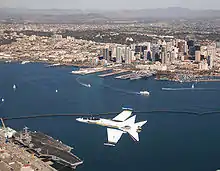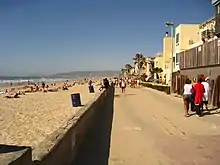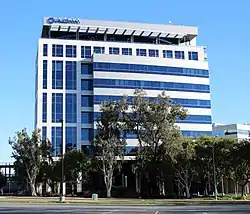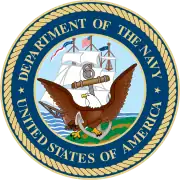Economy of San Diego
The economy of San Diego — of the city of San Diego and the Greater San Diego area, located in southwestern San Diego County, Southern California. The gross domestic product of Greater San Diego was $206 billion in 2014, 17th largest amongst metro areas in the United States and 4th largest amongst California's metro areas.[1] The economy is also part of the San Diego–Tijuana international metropolitan conurbation.
The largest sectors of the San Diego's economy are defense/military, tourism, international trade, and research/manufacturing, respectively.[2][3] In 2014, San Diego was designated by a Forbes columnist as the best city in the country to launch a small business or startup company.[4]

Defense and military
The economy of San Diego is influenced by its deepwater port, which includes the only major submarine and shipbuilding yards on the West Coast.[5] Several major national defense contractors were started and are headquartered in San Diego, including General Atomics, Cubic, and NASSCO.[6][7]
San Diego hosts the largest naval fleet in the world:[8] In 2008 it was home to 53 ships, over 120 tenant commands, and more than 35,000 sailors, soldiers, Department of Defense civilian employees and contractors. San Diego is home to the California National Guard's 79th Infantry Brigade Combat team.[10] About 5 percent of all civilian jobs in the county are military-related, and 15,000 businesses in San Diego County rely on Department of Defense contracts.
Military bases in San Diego include US Navy facilities, Marine Corps bases, and Coast Guard stations. Marine Corps institutions in the city of San Diego include Marine Corps Air Station Miramar and Marine Corps Recruit Depot San Diego. The Navy has several institutions in the city, including Naval Base Point Loma, Naval Base San Diego (also known as the 32nd Street Naval Station), Naval Medical Center San Diego (also known as Bob Wilson Naval Hospital), the Space and Naval Warfare Systems Center San Diego, and Space and Naval Warfare Systems Command ("SPAWAR"). Also near San Diego but not within the city limits are Naval Amphibious Base Coronado and Naval Air Station North Island (which operates Naval Auxiliary Landing Facility San Clemente Island, Silver Strand Training Complex, and the Outlying Field Imperial Beach). San Diego is known as the "birthplace of naval aviation".[11]
The city is "home to the majority of the U.S. Pacific Fleet's surface combatants, all of the Navy's West Coast amphibious ships and a variety of Coast Guard and Military Sealift Command vessels".[12] Two Nimitz-class supercarriers, (USS Carl Vinson, and USS Ronald Reagan),[13][14][15] five amphibious assault ships, several Los Angeles-class "fast" attack submarines, the hospital ship USNS Mercy,[16][17] carrier and submarine tenders, destroyers, cruisers, frigates, and many smaller ships are home-ported there.[14] Four Navy vessels have been named USS San Diego.[18]
Tourism

Tourism is a major industry owing to the city's climate, its beaches, and numerous tourist attractions such as Balboa Park, Belmont amusement park, San Diego Zoo, San Diego Zoo Safari Park, and SeaWorld San Diego. San Diego's Spanish and Mexican heritage is reflected in the many historic sites across the city, such as Mission San Diego de Alcala and Old Town San Diego State Historic Park. Annual events in San Diego include Comic-Con, the Farmers Insurance Open golf tournament, San Diego Pride, the San Diego Black Film Festival, and Street Scene Music Festival. Also, the local craft brewing industry attracts an increasing number of visitors[19] for "beer tours" and the annual San Diego Beer Week in November;[20] San Diego has been called "America's Craft Beer Capital" by San Diego-based author Bruce Glassman.[21]
San Diego County hosted more than 32 million visitors in 2012, of whom approximately half stayed overnight and half were day visitors; collectively they spent an estimated $8 billion locally, with a regional economic impact of more than $18 billion. The visitor industry provides employment for more than 160,000 people.[22] The San Diego Convention Center hosted 68 out-of-town conventions and trade shows in 2009, attracting more than 600,000 visitors.[22] Transient Occupancy Taxes (TOT) have created funding for the City of San Diego Commission for Arts and Culture.[23]
San Diego's cruise ship industry used to be the second-largest in California. Each cruise ship call injects an estimated $2 million (from the purchase of food, fuel, supplies, and maintenance services, not counting the money spent by the tourists) into the local economy.[24] Numerous cruise lines, including Carnival, Holland America, Celebrity, Crystal and Princess, operate out of San Diego. However, cruise ship business has been in steady decline since peaking in 2008, when the Port hosted over 250 ship calls and more than 900,000 passengers. By 2011 the number of ship calls had fallen to 103 (estimated).[25] Holland America and Carnival Cruises operated weekly cruises to the Mexican Riviera for many years, but both ended their regular scheduled service in spring 2012, which was an economic loss to the region of more than $100 million.[25] The decline is blamed on the slumping economy as well as fear of travel to Mexico due to well-publicized violence there.[26]

There are local cruises in San Diego Bay and Mission Bay, available through companies such as Hornblower and H&M. These include sightseeing and "sunset" cruises as well as private-event or "party" cruises. Also available are whale watching cruises to observe the migration of tens of thousands of gray whales that pass by San Diego, peaking in mid-January,[27] and year-round sport fishing expeditions.
International trade
_001.jpg.webp)
San Diego's commercial port and its location on the United States-Mexico border make international trade an important factor in the city's economy. The city is authorized by the United States government to operate as a Foreign Trade Zone.[28]
The city shares a 15-mile (24 km) border with Mexico that includes two border crossings. San Diego hosts the busiest international border crossing in the world, in the San Ysidro neighborhood at the San Ysidro Port of Entry.[29] A second, primarily commercial border crossing operates in the Otay Mesa area; it is the largest commercial crossing on the California-Baja California border and handles the third-highest volume of trucks and dollar value of trade among all United States-Mexico land crossings.[30]
One of the Port of San Diego's two cargo facilities is located in Downtown San Diego at the Tenth Avenue Marine Terminal. This terminal has facilities for containers, bulk cargo, and refrigerated and frozen storage, so that it can handle the import and export of perishables (including 33 million bananas every month) as well as fertilizer, cement, forest products, and other commodities.[31] In 2009 the Port of San Diego handled 1,137,054 short tons of total trade; foreign trade accounted for 956,637 short tons while domestic trade amounted to 180,417 short tons.[32]
Technology
San Diego hosts several major producers of wireless cellular technology. Qualcomm was founded and is headquartered in San Diego, and still is the largest private-sector technology employer (excluding hospitals) in San Diego County.[33] Other wireless industry manufacturers headquartered here include Nokia, LG Electronics,[34] Kyocera International.,[35] Cricket Communications and Novatel Wireless.[36] According to the San Diego Business Journal, the largest software company in San Diego is security software company Websense Inc.[37] San Diego also has the U.S. headquarters for the Slovakian security company ESET.[38]

In 2010, former Governor Arnold Schwarzenegger's Office of Economic Development designated San Diego as an iHub Innovation Center for collaboration potentially between wireless and life sciences, citing the area's wireless business, pharmaceutical research and start-ups for medical devices and diagnostics.[39]
According to the Center for American Entrepreneurship, San Diego was among the top ten cities for technology in 2016-2017, based on the number of local deals.[40]
Life sciences
The presence of the University of California, San Diego, Scripps Research, Sanford Burnham Prebys Medical Discovery Institute, the Salk Institute for Biological Studies, and other world-renowned research institutions has helped fuel the region's biopharmaceutical and medical device growth.[41] Combined, these academic centers were awarded $800 million in NIH grants in 2016.[42] That year, the San Diego life sciences industry employed 45,949 people, many of whom are clustered around the La Jolla and nearby Sorrento Valley areas, which are home to offices and research facilities for numerous biotechnology companies.[43] Major biotechnology companies like Neurocrine Biosciences and Illumina are headquartered in San Diego, while many biotech and pharmaceutical companies, such as BD Biosciences, Biogen Idec, Integrated DNA Technologies, Merck, Pfizer, Élan, Celgene, and Vertex, have offices or research facilities in San Diego. San Diego is also home to more than 140 contract research organizations (CROs) that provide a variety of contract services for pharmaceutical and biotechnology companies.[44]
Real estate
Prior to 2006, San Diego experienced a dramatic growth of real estate prices, to the extent that the situation was sometimes described as a "housing affordability crisis". Median single family home prices more than tripled between 1998 and 2007. According to the California Association of Realtors, in May 2007 a median house in San Diego cost $612,370.[45] Growth of real estate prices was not accompanied by comparable growth of household incomes: the Housing Affordability Index (percentage of households that can afford to buy a median-priced house) fell below 20 percent in the early 2000s. The San Diego metropolitan area had one of the worst median multiples (ratio of median house price to median household income) of all metropolitan areas in the United States,[46] a situation sometimes referred to as a Sunshine tax. As a consequence, San Diego has experienced negative net migration since 2004. A significant number of people moved to adjacent Riverside County, commuting daily from Temecula and Murrieta to jobs in San Diego. Many of San Diego's home buyers tend to buy homes within the more affordable neighborhoods, while others are leaving the state altogether and moving to more affordable regions of the country.[47]
San Diego home prices peaked in 2005, then declined as part of a nationwide trend. As of December 2010, home prices were 60 percent higher than in 2000, but down 36 percent from the peak in 2005.[48] The median home price declined by more than $200,000 between 2005 and 2010, and sales dropped by 50 percent.[49]
Top employers
According to the City's 2017 Comprehensive Annual Financial Report,[50] the top employers in the city are:

| Employer | Number of employees |
|---|---|
| Naval Base San Diego | 34,185 |
| University of California, San Diego | 30,130 |
| San Diego County | 19,131 |
| Sharp HealthCare | 17,976 |
| San Diego Unified School District | 13,815 |
| Qualcomm | 11,830 |
| Scripps Health | 11,807 |
| City of San Diego | 11,454 |
| Kaiser Permanente | 9,066 |
| San Diego Community College District | 6,564 |
Historically tuna fishing and canning was one of San Diego's major industries,[51] and although the American tuna fishing fleet is no longer based in San Diego, seafood company Bumble Bee Foods is still headquartered there.[52][53]
See also
- Companies based in San Diego
References
- https://www.bea.gov/iTable/iTable.cfm?reqid=70&step=1&isuri=1&acrdn=2#reqid=70&step=1&isuri=1&7003=1000&7004=naics&7005=1&7001=21000&7002=2&7090=70
- "City of San Diego website: Economic Development". Sandiego.gov. Archived from the original on May 6, 2011. Retrieved April 11, 2011.
- Powell, Ronald W. (October 17, 2007). "Tourism district OK'd by council". San Diego Union-Tribune. Retrieved April 22, 2009.
- Post, Tom (March 13, 2014). "The Best Places To Launch A Startup In 2014". Forbes. Retrieved 15 June 2015.
- Ronald D. White (July 3, 2011). "Full steam ahead for Nassco shipyard in San Diego". Los Angeles Times. Retrieved September 1, 2012.
- "S.D. companies dominate defense industry rankings". San Diego Union Tribune. August 11, 2010. Retrieved September 1, 2012.
- "San Diego" (PDF). San Diego Convention Center Corporation. City of San Diego. Archived from the original (PDF) on May 5, 2012. Retrieved September 1, 2012.
Several major defense contractors are also headquartered in San Diego, including General Atomics, Cubic and NASSCO.
- Eric Terrill; Julia Thomas, Anne Footer. "Submitted in response to Federal Funding Opportunity: FY 2011 Implementation of the U.S. Integrated Ocean Observing System (IOOS)" (PDF). Southern California Coastal Ocean Observing System. University of California, San Diego. Retrieved April 21, 2011.
- "79th Infantry Brigade Combat Team (IBCT)". calguard.ca.gov/. State of California. 2013. Retrieved June 29, 2014.
- "San Diego: the Birthplace of Naval Aviation Part One". San Diego Air & Space Museum. Retrieved March 28, 2011.
- Tierney Plumb (August 24, 2012). "San Diego companies lead state in '11 defense contracts". San Diego Daily Transcript. Retrieved September 1, 2012.
San Diego houses the largest concentration of military in the world; it is the homeport to more than 60 percent of the ships of the U.S. Pacific Fleet and more than one-third of the combat power of the U.S. Marine Corps.
- Kovach, Gretel C.; Kenney, Mary (June 15, 2011). "Carrier Carl Vinson returns home to San Diego". Union Tribune. Retrieved June 20, 2011.
- "List of Homeports". Chief of Information. United States Navy. Retrieved September 1, 2012.
- Beth Ford Roth (May 9, 2012). "USS Ronald Reagan Coming Home To San Diego In 2013". KPBS Home Post (blog). Retrieved September 1, 2012.
- Phillip Kurata (April 19, 2012). "U.S. Hospital Ship to Help Asian Countries Prepare for Disasters". Bureau of International Information Programs. United States Department of State. Retrieved September 1, 2012.
The USNS Mercy leaves its home port of San Diego May 1 bound for Indonesia, the Philippines, Vietnam and Cambodia.
- Donna Miles (August 31, 2012). "Pacific Partnership Crew Monitors Philippine Earthquake Situation". American Forces Press Service. United States Defense of Defense. Retrieved September 1, 2012.
- "USS San Diego". San Diego Navy Historical Association. Archived from the original on June 21, 2006. Retrieved April 22, 2009.
- Dickerman, Sara (May 25, 2012). "Beyond San Diego's Surf and Sun: Suds". New York Times. Retrieved May 30, 2012.
- "San Diego Kicks Off First-Ever Beer Week". The Full Pint. August 17, 2009. Retrieved May 30, 2012.
- Glassman, Bruce. San Diego's Top Brewers: Inside America's Craft Beer Capital. Chef's Press. ISBN 978-0981622231.
- "San Diego Tourism Industry Research". San Diego Tourism Authority. 2012. Archived from the original on December 21, 2016. Retrieved July 16, 2013.
- "Commission for Arts and Culture: Funding". City of San Diego. Retrieved April 18, 2011.
- "Summary of the Economic and fiscal Impact of Port Tidelands on the Region". Unified Port of San Diego. 2007. Archived from the original on September 27, 2011. Retrieved August 31, 2011.
- Lori Weisberg (May 6, 2011). "San Diego losing another cruise ship". San Diego Union-Tribune. Retrieved August 31, 2011.
- "Carnival Cruise Lines pulling out of San Diego". San Diego Union Tribune. January 13, 2011. Retrieved August 31, 2011.
- "Whale Watching in San Diego". InTheCity-SanDiego Tourism. 2011–2012. Archived from the original on February 7, 2012. Retrieved February 19, 2012.
- "City of San Diego:Foreign Trade Zone". Retrieved April 28, 2011.
- "Number of border crossings stabilizes". San Diego Union-Tribune. July 11, 2010. Retrieved April 28, 2011.
- "SANDAG: Otay Mesa Port of Entry Southbound Truck Route Improvements" (PDF). sandiegohealth.org. Retrieved April 28, 2011.
- "Port of San Diego:10th Avenue Marine Terminal". Archived from the original on May 5, 2011. Retrieved April 28, 2011.
- "National ranking of California ports by cargo volume". San Diego Daily Transcript. March 21, 2011. Retrieved April 28, 2011.
- "City Of San Diego Largest Employers". San Diego Daily Transcript. Retrieved April 22, 2009.
- Glazer, Joyce (October 6, 2008). "San Diego-based LG Mobile Phones donated $250,000 to the VH1 Save the Music Foundation". Entrepreneur Media. Archived from the original on July 24, 2013. Retrieved March 18, 2011.
- Desjardins, Doug (January 11, 2010). "Kyocera International to Get New Leader". San Diego Business Journal. Archived from the original on May 25, 2017. Retrieved March 20, 2011.
- "Novatel website: Corporate headquarters". Retrieved April 11, 2011.
- "Websense Named Top Software Company in San Diego County". NBC News. November 6, 2007. Retrieved April 22, 2009.
- Allen, Mike (September 20, 2010). "ESET Polishes the Apple, Now Protects Macs". San Diego Business Journal. Retrieved March 20, 2011.
- "iHub San Diego" (PDF). California Governor's Office of Economic Development. Archived from the original (PDF) on July 18, 2011. Retrieved April 7, 2011.
- "America's Rising Startup Communities". The Center for American Entrepreneurship. Retrieved January 10, 2019.
- Doyle, Monica (February 5, 2004). "UCSD Extension Awarded A $150,000 Grant For Biotechnology Collaboration With Israel". UCSD News. Retrieved April 22, 2009.
- "2018 California Life Sciences Industry Report". https://califesciences.org/. Retrieved December 21, 2018. External link in
|website=(help) - Walcott, Susan M. (May 2002). "Analyzing an Innovative Environment: San Diego as a Bioscience Beachhead". Economic Development Quarterly. 16 (2): 99–114. doi:10.1177/0891242402016002001. Archived from the original on July 24, 2013. Retrieved November 4, 2010.
- Bigelow, Bruce V. "San Diego's Life Sciences CROs—The Map of Clinical Research Organizations", "Xconomy", San Diego, January 27, 2010.
- California Association of Realtors (June 25, 2007). "C.A.R. Reports Sales Decrease 25 Percent in May, Median Price of a Home in California at $591,180, up 4.8 Percent from Year Ago". Business Wire. Retrieved April 22, 2009.
- Cox, Wendell (January 28, 2009). "New Survey: Improving Housing Affordability – But Still a Way to Go". NewGeography. Retrieved June 20, 2013.
- Weisberg, Lori (March 22, 2007). "Greener pastures outside of county?". San Diego Union-Tribune. Retrieved April 22, 2009.
- Freeman, Mike (December 29, 2010). "Housing Prices Fall Again, Index Says". San Diego Union Tribune. Retrieved May 4, 2011.
- Showley, Roger (May 9, 2010). "Realty Revival". San Diego Union Tribune. Retrieved May 4, 2011.
- City of San Diego, California Comprehensive Annual Financial Report, for the Year ended June 30, 2017
- "Tuna! Celebrating San Diego's Famous Fishing Industry". San Diego History Center. Retrieved September 1, 2012.
- Roger Showley (January 29, 2013). "Bumble Bee may buzz downtown: The tuna company considers high-profile move from Kearny Mesa". San Diego Union Tribune. Retrieved February 3, 2013.
- "Chicken of the Sea leases in Sorrento South". The Daily Transcript. August 22, 2011. Retrieved February 3, 2013.



